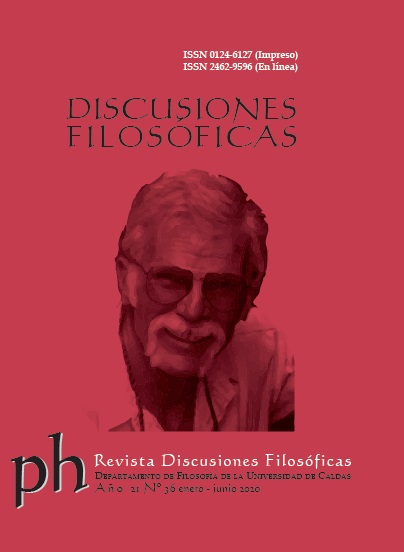Autores/as
Resumen
John Searle ha defendido un enfoque intencionalista de lo social, a saber, la idea de que la realidad social es creada y mantenida por ciertos estados mentales
y actos de habla. En este trabajo, en primer lugar, presentamos una versión detallada de los argumentos fundacionales de Searle, basada en la conexión entre
reconocimiento colectivo y lenguaje. En segundo lugar, ofrecemos una crítica de estos argumentos, sugiriendo que ellos mismos nos llevan a admitir que los
fundamentos de la realidad social son más prácticos que representacionales.
Palabras clave
Citas
Brandom, Robert. “A hegelian model of legal concept determination: the normative fine structure of the judge’s chain novel”. Hubbs, Graham y Lind, Douglas (Eds.) Pragmatism, law and language. New York: Routledge. 2014. Print.
______. “Some pragmatist themes in Hegel’s idealism”. Tales of the mighty dead (pp. 210-234). Cambridge, MA: Harvard University Press. 2002. Print.
______. Making it explicit: reasoning, representing and discursive commitment. Cambridge, MA: Harvard University Press. 1994. Print.
Chant, Sara, Hindriks, Frank & Preyer, Gerhard. (eds.) From individual to collective Intentionality: New Essays, Nueva York: Oxford University Press. (2014). Print.
Gilbert, Margaret. “Acting together”. Joint commitment: How we make the social world. Nueva York: Oxford University Press. (2014). Print.
Hornsby, Jennifer. (1997). “Collectives and intentionality”. Philosophy and Phenomenological Research. Jun. 57 (2). 1997: pp. 429-434. Print.
Kukla, Rebecca & Lance, Mark. Yo and Lo: The pragmatic topography of the space of reasons. Cambridge, MA: Harvard University Press. 2009. Print.
Lawson, Tony. “Comparing conceptions of social ontology: emergent social entities and/or institutional facts?” Journal for the Theory of Social Behaviour. Dec. 46 (4). 2016: 359-399. Print.
______. “A conception of social ontology”. Pratten, Stephen (Ed.). Social ontology and modern economics. New York: Routledge. 2015. Print.
Malinowski, Bronislaw. Crimen y costumbre en la sociedad salvaje. Barcelona: Planeta-De Agostini. 1985. Impreso.
Rouse, Joseph. “Social practices and normativity”. Philosophy of the Social Sciences. Mar. 37 (1). 2007: pp.1-11. Print.
______. How scientific practices matter: reclaiming philosophical naturalism. Chicago: University of Chicago Press. 2002. Print.
Sánchez Cuenca, Ignacio. “A behavioural critique of Searle’s theory of institutions”. Tsohatzidis, S. (Ed.) Intentional acts and institutional facts: essays on John Searle’s social ontology. Dordrecht: Springer. 2007. Print.
Searle, John, Ferraris, Maurizio & Condello, Angela. Money, social ontology and law. Nueva York: Routledge. 2019. Print.
______. Making the social world: the structure of human civilization. Nueva York: Oxford University Press. 2010. Print.
______. “Responses to critics of The Construction of Social Reality”. Philosophy and Phenomenological Research. Jun. 57(2). 1997: pp. 449-458. Print.
______. The construction of social reality. Nueva York: The Free Press. 1995. Print.
Smith, Barry. “John Searle: From speech acts to social reality”. Smith, B. (ed.) John Searle. Cambridge, UK: Cambridge University Press. (2003) Print.
Vicari, Giuseppe. “Collective intentionality, language and normativity: a problem and a possible solution for the analysis of cooperation”. Epkeina. 5 (1). 2015: 183-207.
Wilson, Robert. “Social reality and institutional facts”. Tsohatzidis, S. (Ed.) Intentional acts and institutional facts: essays on John Searle’s social ontology. Dordrecht: Springer. 2007. Print.
Zimmermann, Stephan. “Is society built on collective intentions? A response to John Searle”. Rivista di estetica. 57. 2014: pp. 121-141. Print.

 PDF
PDF
 FLIP
FLIP



























